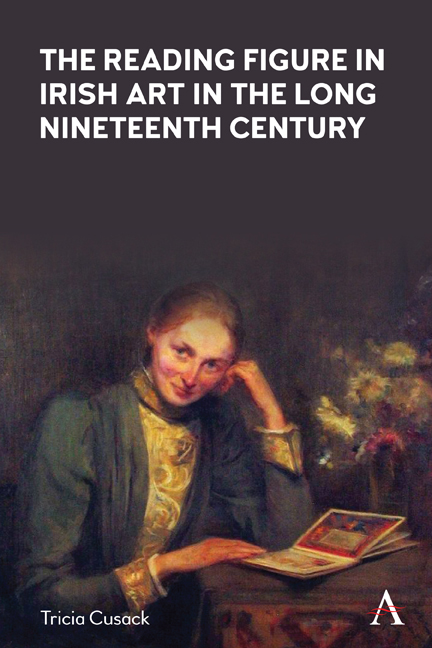Book contents
- Frontmatter
- Contents
- List of Figures
- Acknowledgements
- Introduction
- 1 Imperial Man, Manly Nationalism and the Unmanly Reader
- 2 ‘Creatures of a Different Breed’: Women Readers and Patriarchal Discourse
- 3 The Shaping of the New Woman in Ireland
- 4 The Silent Reader and the Fictive Viewer
- 5 A Room of Her Own: Four New Women in Dublin
- Conclusion
- Notes
- Works Referenced
- Index
1 - Imperial Man, Manly Nationalism and the Unmanly Reader
Published online by Cambridge University Press: 27 April 2022
- Frontmatter
- Contents
- List of Figures
- Acknowledgements
- Introduction
- 1 Imperial Man, Manly Nationalism and the Unmanly Reader
- 2 ‘Creatures of a Different Breed’: Women Readers and Patriarchal Discourse
- 3 The Shaping of the New Woman in Ireland
- 4 The Silent Reader and the Fictive Viewer
- 5 A Room of Her Own: Four New Women in Dublin
- Conclusion
- Notes
- Works Referenced
- Index
Summary
Most Irish portraits of this period found in art galleries, other institutions such as the Royal Irish Academy (RIA) or Irish country houses are of men. Many displayed the achievements, status or wealth of the Anglo-Irish. It is noticeable that relatively few among them represent men reading, or even holding a book. This chapter asks why so few men were shown with books and, when they were, what those books might signify. It argues that reading, especially fiction such as novels for pleasure, was incompatible with dominant notions of masculinity, whether imperial or nationalist. Portraits that do show men with books often follow an earlier use of accessories to indicate rank or profession, and reading matter tends to be explicit and instrumental, such as a Bible. Although some nationalists advocated the reading of old Gaelic tales, this was often to serve a practical purpose offering exemplars of masculine valour, rather than to provide an intellectual or imaginative experience. Homeric epics played a similar role in preparing privileged British and Anglo-Irish pupils and students for imperial service. Not all men subscribed to the dominant ideas of masculinity and some were committed readers who enjoyed fiction. The chapter concludes by considering some visual examples of unmanly engagement in reading for pleasure.
Imperial man and manliness
In Manliness and Culture, a booklet in its third edition by 1877, John Brookes enumerates exemplary manly qualities such as decisiveness, heroism and a rejection of domesticity, justified by an appeal to religion. Thus he proposes a Christian conception of manliness that entails ‘openness to God's Light and Love [and] cheerful decisiveness […] It is unmanly to be doubtful, timorous, uncertain’. Brookes further notes, ‘There can be no manliness […] without heroism’ and that ‘A brave man has contempt for […] cushions, and easychairs’. Brookes assumes that cushions and easy chairs are available, suggesting he is not addressing the poor or working-class man. Robert Baden-Powell, a British army officer, in 1908 reiterates the undesirable ‘softening’ effect of domesticity on boys in his manual for boy scouts. As an aggressive imperialist, ‘when Baden-Powell organized his Scout movement he did so with one primary motive – to prepare the next generation of British soldiers for war and the defence of the Empire’.
- Type
- Chapter
- Information
- Publisher: Anthem PressPrint publication year: 2022



